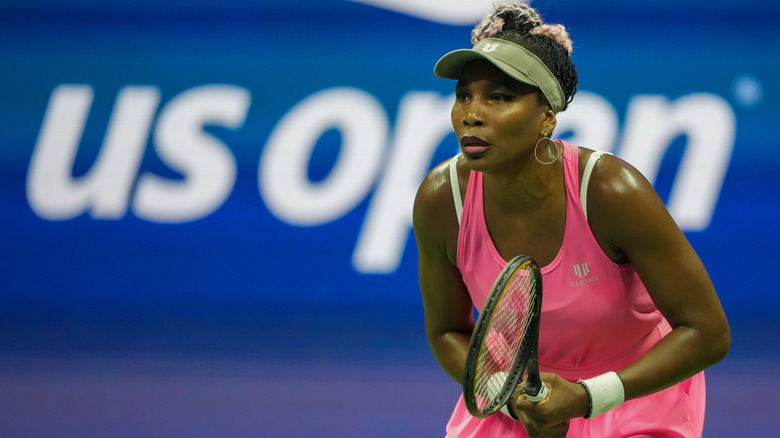5 Details About Venus Williams' Health Struggles
Venus Williams is an icon — a living legend, if you will. She's the most decorated Olympic tennis champion of all time and is still playing professional tennis well into her 40s despite her sister Serena Williams' retirement from the sport. She managed to remain one of the world's top players for decades, but then she started experiencing some debilitating symptoms that started to impact her performance, and in 2011, the tennis star was diagnosed with Sjögren's syndrome, an autoimmune disease caused by the body attacking its own exocrine glands. These glands are responsible for producing moisture — from sweat and saliva to tears, per Cleveland Clinic.
Sjogren's syndrome threatened to end William's career, but she wouldn't let it, fighting tooth and nail to reclaim her spot on the list of the world's best players. Doing so meant facing her illness head-on and changing the way she looked at and treated her body. While Sjogren's is treatable, it cannot be cured, and Williams has had to form many new habits to return to playing professional tennis; it might be safe to say she aced it, but getting there was no easy feat.
She went undiagnosed for a long time
The thing about Sjogren's syndrome is that it is quite difficult to diagnose, and various other conditions have to be ruled out first before doctors can make a final diagnosis. In Venus Williams' case, it took seven years before doctors finally figured out what was causing her symptoms. Like many other celebrities' health struggles that flew under the radar, many had no idea Williams was experiencing symptoms that were affecting her tennis game. "It was a head trip. I wasn't reaching my full potential and I didn't know why," Williams told Harper's Bazaar. "Was I working too hard? What was I doing wrong? That takes its toll and it's not easy to walk out there when you don't have much to give."
Speaking to Essence, the tennis star recalled how she first started experiencing symptoms in 2004. She couldn't get fit, no matter how hard she trained. This caused her to be even harder on herself, deciding that she was simply lazy and had to train more. "As an athlete, you don't make excuses. Either you do it or you don't," she told the outlet of her mindset at the time. Speaking to the Sjogren's Foundation, Williams said she received many misdiagnoses before doctors finally realized the culprit was Sjogren's. "I understand the daily struggles and the strength it takes to open up about your journey," she said.
She dealt with very debilitating symptoms
Not being able to perform at her best was arguably one of Venus Williams' most debilitating symptoms. As an athlete, you need to be on top of your game, and she simply could no longer play tennis on that level.
Sjogren's syndrome's main symptoms include extreme dryness all over the body — dry eyes, nose, throat, mouth, skin, and vaginal dryness is common. The syndrome can also affect the digestive system. Aside from dryness, this autoimmune disease also causes patients to experience muscle pain and weakness, joint pain, and debilitating fatigue. Additionally, patients can experience brain fog and rashes and might find talking and swallowing challenging. Some also experience tooth decay, heartburn, indigestion, neuropathy, and sensitivity to light.
For Williams, the constant fatigue and pain are what got the better of her. "No matter how hard I worked, I was exhausted, short of breath, and never felt in shape. It was really frustrating," she told Prevention. "My symptoms got progressively worse, to the point where I couldn't play professional tennis anymore." Williams would pay frequent visits to her doctor, desperate to get to the root of what was causing her symptoms but her test results would always come back normal. "I felt out of control," she admitted. Eventually, she got so sick that she could barely function normally. The persistent fatigue and pain started to affect her quality of life. "Just being alive was very uncomfortable," she recalled.
Venus realized she had to slow down after her diagnosis
If there's one thing Sjogren's syndrome taught Venus Williams, it's the art of slowing down. As an athlete, she was used to hustling and pushing herself, but Sjogren's made keeping up this lifestyle impossible. "When you crash, you go so hard that you can't get up, literally," Williams recalled during an interview with Harper's Bazaar. "There is no substitute for being well. I had to change my pace."
In 2011, it seemed like the tennis star's disease was set to end her career for good. She had to forfeit the U.S. Open because she was too tired to compete. As a result, she lost her spot on the list of the top 100 tennis players in the world— a list she had consistently stayed on since 1996. It was devastating, but Williams realized she had to put her health first, and the medications she was taking after her diagnosis weren't quick fixes either. "One of the medications I had took six months to set in. There was another that took one to three months. It was kind of a waiting game until you can go back to what you had been doing," she told Prevention.
Taking a step back from her career and confronting her illness head-on required a lot of bravery. "I just spent my whole life just pushing myself and if you work hard enough, you'll get what you want. Guess what? Now that's all out of the window. So I had to learn to overcome fear," Williams told Good Morning America. She admitted that she had to take each day as it came and focus on getting through it. While it was tough, the tennis star eventually chose to hone in on how she could use the challenges she was facing to make her stronger.
She had to change her diet completely
Something you might not know about Venus Williams is that she had to make some big changes to her diet to manage Sjogren's syndrome. "Lifestyle changes like exercise, a healthy diet, and good sleeping habits can help someone with autoimmune disease feel better," Paula Marchetta, M.D. told Prevention. This was definitely true for the tennis star, who went on a strict diet following her diagnosis — she became vegan and tried to cut sugar from her diet. She also tried to steer clear of processed foods.
Williams made sure to fuel her body properly despite being on a strict diet. She told Prevention that she'd kick off her mornings with fresh fruits and a smoothie and eat a hearty lunch chock-full of the essentials, like vegetables, carbs, and protein. She'd adjust her diet accordingly depending on her training and competition schedule. "If it's leading up to a big match or it's dinner I'll eat a little heavier," she explained.
Something else Williams likes to nibble on every now and then, despite her vegan diet, is cheese. She confessed this during an interview with Experience Life, referring to herself as a "cheagan" (cheating vegan). She also has some sugar every now and then. "I have some fun with sweets, too. I'm only human!" she quipped.
It took a great deal of mental strength to overcome her health issues
Getting diagnosed with an autoimmune disease is a life-changing event that can turn your world upside down, and while Sjogren's syndrome sure tried to break Venus Williams' spirit, she fought to get out the other end with all her might. But it wasn't easy. The tennis star might've had tons of physical strength thanks to her career, but it was her mental strength that truly got tested while she dealt with debilitating symptoms. She told Harper's Bazaar that, while her diagnosis was a relief, it was also devastating. "It was hard to accept. I'm used to doing whatever I want, working hard and staying fit. To realize that it's not something you can work through, that this is your life now ... that was hard," she admitted.
While speaking to Prevention, Williams said she had to accept that life has its ups and downs and that working with the lows instead of trying to fight them is the key to success. "Life has changed a little bit, but it doesn't mean that you can't achieve the same things. You just have to be smarter," she said. Williams had to completely change her usual all-or-nothing mindset to accommodate her body and its needs. Speaking to Experience Life, she explained how she started focusing on what she could do instead of the things that were out of reach. Celebrating the small wins — like a five-minute run — became her go-to method for not giving up.
"Being mentally strong is so important," she told Harper's Bazaar, noting that it's a very personal thing and that no one else but you can win the battles inside your head. This is something tennis taught her, and a lesson she will always carry with her.





